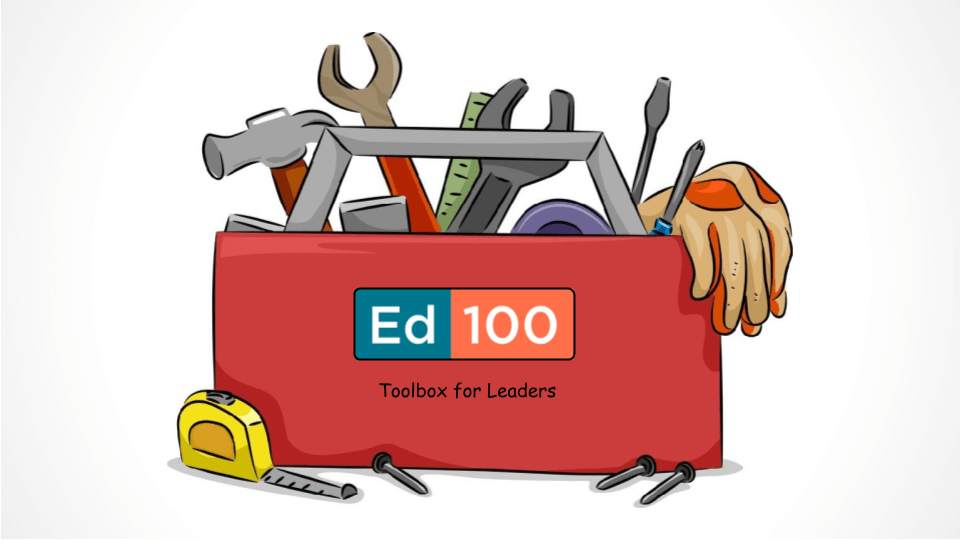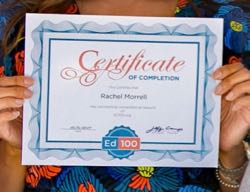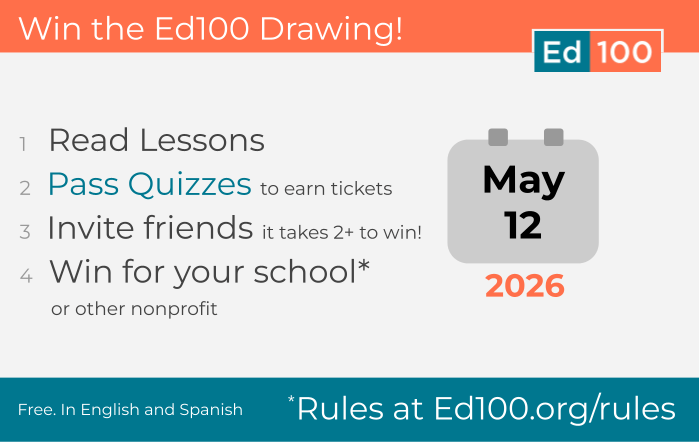The Ed100 Toolbox

Practical help for school community leaders
Schools can bind communities together.
In This Post
Ed100 Graduate Certificate
The Ed100 Blog
Our Mailing List
The Drawing
The Leaderboard
Ed100 in 10 Weeks (Ten in 10)
Discussion Guides
Discussion Groups
YouTube Videos
Parent Leader Guide
Flyers, Logos and More
Content for Presentations
Search Ed100
The LCAP checklist
Ed100 on social media
Charts and data
Contact us
It has never been more important to build well-informed school communities. This shared work can connect people in ways that span partisan divisions and overcome biases.
It doesn’t happen magically. To those of you who have stepped up to active participation in PTAs, site councils, boards, ASBs, ELACs and the like, thank you. Ed100 exists to support you.
A few years ago, a PTA leader asked me for a short overview presentation about Ed100, and I found myself rummaging around for it on our public Google drive folder. Slap to the forehead: if I can't find it, neither can you. (It’s here, by the way.)
So here ya go. This post summarizes tools we have created to support you. Use what you like! Is there something more or different that would help you? Let us know!
Jeff explains how Ed100 works and some of the tools that can help communities make use of it.
1 The Ed100 Graduate Certificate
The backbone of Ed100 is an orderly set of lessons in ten chapters. We update them regularly, and aim to keep them concise. Each lesson focuses on an important aspect of the education system, examining it from different angles.
At the end of each lesson a quiz question reinforces one main point. The quizzes aren't difficult — they're just designed to help you pause and remember what you've learned.
The Ed100 Graduate Certificate is a mark of achievement. You earn it by passing every quiz in Ed100. Hundreds have earned this certificate, including parents, teachers, students, administrators, and even district superintendents. Why not challenge yourself to earn yours? When you do, please print it and share a selfie to encourage others! Send it to us and we will happily feature your achievement on our social media. (You can find your certificate on your profile page.)
2 The Ed100 Blog
The Ed100 blog expands beyond our lessons. This is where we plunge into important topics more deeply, explore varying perspectives, and occasionally take a point of view.
We have invested significantly in key blog posts. For example, our post about teacher strikes is an important extension of our lesson about teacher pay. Our series of posts about the California School Dashboard is vital for understanding your role in holding your school and district accountable for success. Our series about school boards and site councils explains important elements of the school system that are often misunderstood. Our post about homework is an important extension of Chapter 4 (time). The blog also includes features on grade inflation, the California Lottery, the state budget, California’s funding for arts education, and other critical topics.
3 The Ed100 newsletter
When you sign up for Ed100, you receive our email newsletter. About once a week, our emails highlight new blog posts and updated lessons worth checking out.
4 The Ed100 Drawing
We periodically hold drawings for Ed100, with a prize of $1,000. Each quiz you pass on Ed100 earns an entry for an education-focused non-profit organization of your choice, such as your PTA. Why do we do this? Because it can help you spark conversations in your school community! Here’s an example of what you might say:
“Hey everybody, please join Ed100.org with me — it’s free, and it helps us learn about our role in the education system. The lessons are interesting, and each quiz you pass earns a chance for our school to win $1,000. The deadline is coming up, so please sign up today and take a few of them. We’ll check in about it at our next meeting.”
5 The Ed100 Leaderboard
The Ed100 Leaderboard helps you celebrate progress in use of Ed100 in your school community. If you consistently bring attention to it, you can create some learning momentum. Here’s an example of what you might say about it:
“At our last meeting I urged everyone to sign up for Ed100 and take some quizzes. I see from the Leaderboard that four of you have done that, which is a great start! Mónica, you shared your name on the leaderboard — will you talk about what you learned?”
6 Custom Leaderboard
If you are a leader of an organization that spans several schools, and you want to build Ed100 usage across those schools, contact us with your list of schools. We can develop a custom leaderboard for you to develop some friendly competition. Remember, the point is learning, not winning!
7 Ed100 in 10 Weeks
Have you tried completing Ed100… but life happens and finishing it up falls to the back of your mind? It happens.
That’s why we created Ed100 in 10 Weeks (also known as our 10 in 10 program). Sign up and you’ll receive a syllabus to break down your daily readings, along with a daily reminder email with a positive message and links to your reading (think the fun of Duolingo).
Before you know it, 10 weeks will fly by — and you'll be an Ed100 graduate.
8Ed100 ★ Discussion Guides
Try the discussion guides! Look for the orange star ★ at the top of each lesson.
Ed100 is most valuable when groups of people use it together as a framework for learning. It's easier than you might think! We created a set of discussion guides for each chapter of Ed100, and they are all linked directly from each lesson, in English and Spanish. Just look for the orange star ★ at the top of each lesson. For advice about leading a discussion group or to join an Ed100 Ten in 10 group cohort, please contact Chantal.
9 Ed100 videos on YouTube
The introduction to each chapter of Ed100 includes a brief overview video (about 5-8 minutes or so). You can find all ten of them in the Ed100 YouTube channel.
These videos are great for PTA meetings because they are brief, informative and they help bring everyone to a basic shared level of understanding quickly so that everyone can participate.
10 The Ed100 Parent Leader Guide
The Ed100 Parent Leader Guide provides ready-to-go plans for parent group meetings. It's all here: lessons, discussion guides, handouts and action steps.
Using these resources, you can build your school's capacity to face facts, work together, sharpen focus, or change direction.
11 Content for Presentations, Meetings and Emails
Want to include some content from Ed100 in an email, meeting or presentation for your PTA or school group? Go for it. Feel free to draw from our lessons and blog posts (with attribution). We have more to offer, though. For example, if you want to give people a feel for how Ed100 works and how to get started with it, use our Ed100 Mini-presentation. It's short and sweet.
Looking to start a conversation? Try selecting teaser questions from our Big Book of Questions. It's a deck of Google Slides that you can copy, edit and share. (You can also download it as a PowerPoint file, if you prefer.)
Need a copy of the Ed100 logo to add it to your PTA unit or council web page? Or a flier to print and hand out, or forward? Want to find the data behind a chart you see on an Ed100 lesson? Or just want to dig around in the Ed100 toolbox? Help yourself to our Ed100 Public Folder.
12 The Ed100 Search Function
Looking for something specific? Try our search function. It spans both the lessons and the blog, in English or Spanish. Viewed on desktop, the search function is at the top, easy to find. On a mobile device, it’s a little hidden — find it toward the bottom of the “hamburger” menu.
13 The LCAP Checklist
The LCAP: The most interesting boring document you'll ever pretend to read
A key concept of California's education system is that local communities have a lot of power — and also responsibility. The Local Control Funding Formula (LCFF) makes communities the ultimate source of accountability for school results. The Local Control Accountability Plan, written annually by your school district, is the most interesting boring document you'll ever pretend to read. You know who it's written for, right? It's supposed to be for you.
Want to change your district's priorities? The LCAP is your friend. Read the current plan and then think specifically about how to change it. Talk with others about it. The words in the plan matter.
The LCAP Checklist is a simple tool co-developed by Ed100 and the California State PTA that has been updated since the LCAP’s debut more than a decade ago. This tool can help you prepare for your community LCAP meetings. The checklist is linked to lessons in Ed100 that can make your research easier. By using it, you can tie your feedback directly to each section of your district's LCAP.
14 Ed100 on Social Media
If you're a Facebook user, please find, follow and share the Ed100 Facebook page. Also Instagram and Twitter (X). We occasionally post on LinkedIn, too.
15 Contact Us!
We often include our email addresses in our posts. I'm [email protected]. Chantal is [email protected]. Carol is [email protected]. We get busy, so please be patient with us — but we really do like to hear from you. You can also submit comments for specific lessons and posts. (Comments are curated. All are read.)
Updated June, 2025
Tags on this post
Parent EngagementAll Tags
A-G requirements Absences Accountability Accreditation Achievement gap Administrators After school Algebra API Arts Assessment At-risk students Attendance Beacon links Bilingual education Bonds Brain Brown Act Budgets Bullying Burbank Business Career Carol Dweck Categorical funds Catholic schools Certification CHAMP Change Character Education Chart Charter schools Civics Class size CMOs Collective bargaining College Common core Community schools Contest Continuous Improvement Cost of education Counselors Creativity Crossword CSBA CTA Dashboard Data Dialogue District boundaries Districts Diversity Drawing DREAM Act Dyslexia EACH Early childhood Economic growth EdPrezi EdSource EdTech Education foundations Effort Election English learners Equity ESSA Ethnic studies Ethnic studies Evaluation rubric Expanded Learning Facilities Fake News Federal Federal policy Funding Gifted Graduation rates Grit Health Help Wanted History Home schools Homeless students Homework Hours of opportunity Humanities Independence Day Indignation Infrastructure Initiatives International Jargon Khan Academy Kindergarten LCAP LCFF Leaderboard Leadership Learning Litigation Lobbyists Local control Local funding Local governance Lottery Magnet schools Map Math Media Mental Health Mindfulness Mindset Myth Myths NAEP National comparisons NCLB Nutrition Pandemic Parcel taxes Parent Engagement Parent Leader Guide Parents peanut butter Pedagogy Pensions personalized Philanthropy PISA Planning Policy Politics population Poverty Preschool Prezi Private schools Prize Project-based learning Prop 13 Prop 98 Property taxes PTA Purpose of education puzzle Quality Race Rating Schools Reading Recruiting teachers Reform Religious education Religious schools Research Retaining teachers Rigor School board School choice School Climate School Closures Science Serrano vs Priest Sex Ed Site Map Sleep Social-emotional learning Song Special ed Spending SPSA Standards Strike STRS Student motivation Student voice Success Suicide Summer Superintendent Suspensions Talent Teacher pay Teacher shortage Teachers Technology Technology in education Template Test scores Tests Time in school Time on task Trump Undocumented Unions Universal education Vaccination Values Vaping Video Volunteering Volunteers Vote Vouchers Winners Year in ReviewSharing is caring!
Password Reset
Search all lesson and blog content here.
Login with Email
We will send your Login Link to your email
address. Click on the link and you will be
logged into Ed100. No more passwords to
remember!
















Questions & Comments
To comment or reply, please sign in .
Kelly Donivan August 26, 2025 at 3:04 pm